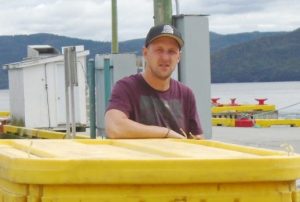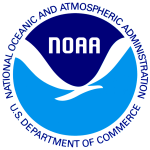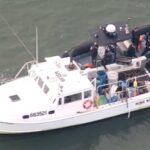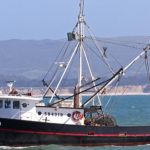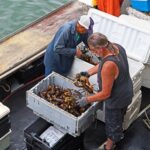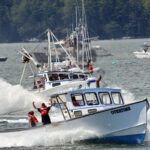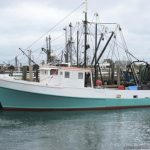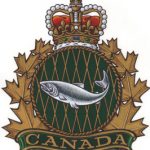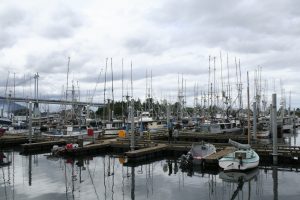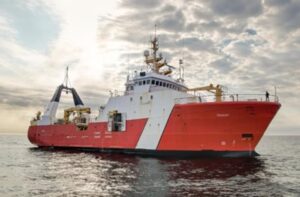Monthly Archives: August 2016
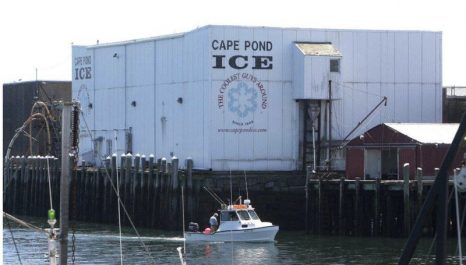
Cape Pond Ice building on the block again
The Cape Pond Ice property at 104 Commercial St. is back on the market. Almost four years after he first listed the property for sale, Cape Pond Ice President Scott Memhard has retained Nordlund Associates to market the approximately 41,000-square-foot property to potential buyers, with the intention of leasing back a portion to run a scaled-back ice manufacturing and delivery operation. The ice company, made famous in “The Perfect Storm” book by Sebastian Junger and the subsequent film of the same name, has seen its fortunes deteriorate along with those of the city’s once-mighty-but-now-dwindling commercial fishing fleet. The industry’s demise has slashed its demand for ice until it now represents only about 10 percent of the company’s overall sales. Read the rest here 19:44
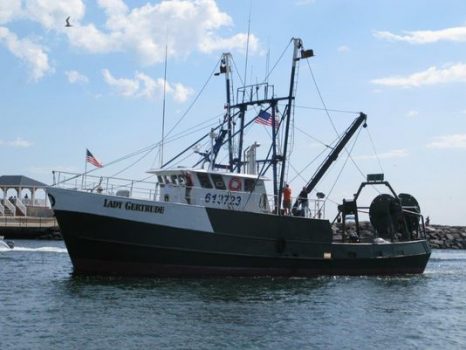
Crew rescued from sinking fishing vessel off NJ coast
The commercial fishing vessel Lady Gertrude sank early Monday morning while it was fishing about 40 miles southeast of Sandy Hook, according to the U.S. Coast Guard. Petty Officer Steve Strohmaier, Coast Guard Station New York, said the vessel started taking on water and the vessel’s three-man crew abandoned the ship and got into a life raft. The crew put on their survival suits and activated the boat’s emergency radio beacon before leaving the craft. Strohmaier said good Samaritans from the boat Mazey James rescued the crew — all three of which survived the ordeal. The New York Police Department’s Aviation Unit and the U.S. Coast Guard both responded. Stohmaier said what caused the Lady Gertrude to sink is under investigation. Read the rest here 16:12
Ten Day At Sea Joint Mission Successfully Tallies 20+ Violations
 On March 10, 2016, two Alaska Wildlife Troopers, a public safety technician, and a NOAA Enforcement Officer got underway for a 10-day at-sea operation in the Aleutian chain, Alaska. The joint patrol mission was focused on conducting at-sea boarding’s, as well as inspections of state and federal commercial fishing vessels and processors operating in the Gulf of Alaska. What they thought would be a relatively smooth mission, turned into much more than they bargained for. With days of 40 knot (46 MPH) winds, 10-15 foot seas, and snow, “it was more than I’m used to,” said Enforcement Officer Noah Meisenheimer of the NOAA Office of Law Enforcement Office. Aboard the State of , the crew wasn’t in imminent danger. But, on day eight of the nearly 1,300 nautical mile trek, a nearby vessel was. It was a particularly stormy evening when the vessel Stanley K had its anchor wrap around the propeller. By the end of the at-sea patrol, the Stimson team had successfully conducted this rescue mission, inspected more than 100 cod pots, boarded for examination 35 commercial vessels, and audited four seafood processors. In total, eight federal and 13 state violations were documented. Read the rest here 14:51
On March 10, 2016, two Alaska Wildlife Troopers, a public safety technician, and a NOAA Enforcement Officer got underway for a 10-day at-sea operation in the Aleutian chain, Alaska. The joint patrol mission was focused on conducting at-sea boarding’s, as well as inspections of state and federal commercial fishing vessels and processors operating in the Gulf of Alaska. What they thought would be a relatively smooth mission, turned into much more than they bargained for. With days of 40 knot (46 MPH) winds, 10-15 foot seas, and snow, “it was more than I’m used to,” said Enforcement Officer Noah Meisenheimer of the NOAA Office of Law Enforcement Office. Aboard the State of , the crew wasn’t in imminent danger. But, on day eight of the nearly 1,300 nautical mile trek, a nearby vessel was. It was a particularly stormy evening when the vessel Stanley K had its anchor wrap around the propeller. By the end of the at-sea patrol, the Stimson team had successfully conducted this rescue mission, inspected more than 100 cod pots, boarded for examination 35 commercial vessels, and audited four seafood processors. In total, eight federal and 13 state violations were documented. Read the rest here 14:51
MAFMC and ASMFC Actions on Black Sea Bass, Bluefish, Scup and Summer Flounder
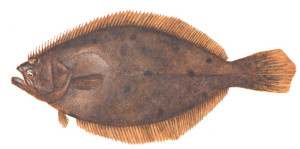 Last week the Mid-Atlantic Fishery Management Council (Council) and the Atlantic States Marine Fisheries Commission (Commission) reviewed previously implemented specifications for scup, black sea bass and bluefish fisheries and modified specifications for summer flounder. The Commission’s actions are final and apply to state waters. The Council will forward its federal waters recommendations regarding summer flounder specifications to NOAA Fisheries Greater Atlantic Regional Fisheries Administrator for final approval. For summer flounder, both groups approved a commercial quota of 5.66 million pounds and a recreational harvest limit of 3.77 million pounds for 2017, an approximate 30% decrease from 2016. This decrease in catch and landings limits responds to the findings of the 2016 stock assessment update, which indicates summer flounder has been experiencing overfishing since 2008. Read the rest here 12:06
Last week the Mid-Atlantic Fishery Management Council (Council) and the Atlantic States Marine Fisheries Commission (Commission) reviewed previously implemented specifications for scup, black sea bass and bluefish fisheries and modified specifications for summer flounder. The Commission’s actions are final and apply to state waters. The Council will forward its federal waters recommendations regarding summer flounder specifications to NOAA Fisheries Greater Atlantic Regional Fisheries Administrator for final approval. For summer flounder, both groups approved a commercial quota of 5.66 million pounds and a recreational harvest limit of 3.77 million pounds for 2017, an approximate 30% decrease from 2016. This decrease in catch and landings limits responds to the findings of the 2016 stock assessment update, which indicates summer flounder has been experiencing overfishing since 2008. Read the rest here 12:06
Antiquities Act Proposal would devastate California’s fishing industry – D.B. Pleschner
 California’s fisheries provide healthy, sustainable food, but that could change under a dangerous new proposal being circulated, until recently, behind closed doors at the Legislature. California’s fishing community – more than 40 harbors, chambers of commerce, seafood processors and recreational and commercial fishing groups – has united to oppose the proposal to declare virtually all offshore seamounts, ridges and banks off the coast as monuments under the Antiquities Act and permanently close these areas to commercial fishing. After pursuing rumors, fisheries groups discovered the proposal, along with a sign-on letter encouraging legislative support. But no one bothered to seek any input from recreational and commercial fishermen. Even worse, there has been no scientific review or economic analysis, no public participation and no transparency. Read the rest here 10:46
California’s fisheries provide healthy, sustainable food, but that could change under a dangerous new proposal being circulated, until recently, behind closed doors at the Legislature. California’s fishing community – more than 40 harbors, chambers of commerce, seafood processors and recreational and commercial fishing groups – has united to oppose the proposal to declare virtually all offshore seamounts, ridges and banks off the coast as monuments under the Antiquities Act and permanently close these areas to commercial fishing. After pursuing rumors, fisheries groups discovered the proposal, along with a sign-on letter encouraging legislative support. But no one bothered to seek any input from recreational and commercial fishermen. Even worse, there has been no scientific review or economic analysis, no public participation and no transparency. Read the rest here 10:46
Whale wars: Humpbacks versus Orcas focus of new study
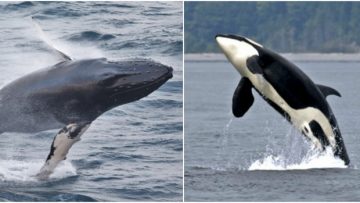 It’s a strange marine phenomenon: humpback whales actively defend other marine mammals like seals and grey whales from orca attacks, according to a new study. But while some people might call it a rare example of interspecies altruism, the study also found that these attacks are likely a survival behaviour due to orcas’ tendency to feed on humpback calves. Robert Pitman, a marine ecologist in the National Oceanic and Atmospheric Administration’s Southwest Fisheries Science Center in southern California, is the lead author of the study recently published in the Marine Mammal Science journal. He told The Early Edition he first became intrigued about the phenomenon during a research trip to Antarctica.”One day, we saw a killer whale chasing a seal. [The seal] started swimming out towards where a humpback was at the surface, and the humpback rolled over, and lifted the seal up on its chest,” he said Read the rest here 09:53
It’s a strange marine phenomenon: humpback whales actively defend other marine mammals like seals and grey whales from orca attacks, according to a new study. But while some people might call it a rare example of interspecies altruism, the study also found that these attacks are likely a survival behaviour due to orcas’ tendency to feed on humpback calves. Robert Pitman, a marine ecologist in the National Oceanic and Atmospheric Administration’s Southwest Fisheries Science Center in southern California, is the lead author of the study recently published in the Marine Mammal Science journal. He told The Early Edition he first became intrigued about the phenomenon during a research trip to Antarctica.”One day, we saw a killer whale chasing a seal. [The seal] started swimming out towards where a humpback was at the surface, and the humpback rolled over, and lifted the seal up on its chest,” he said Read the rest here 09:53
Watermen’s Appreciation Day – A day on the bay of the Eastern Shore
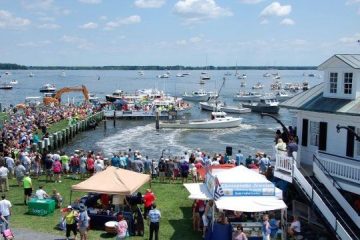 “In Maryland here were called watermen which is a term that’s -a follower, we’re not only crabbers, we’re clammers, we’re oyster men, we’re hunters, we’re fishermen, we do it all,” said Captain Robert Newberry of the Watermen’s Association. This all used to be done be sail . The Chesapeake Bay is the largest estuary in the world and the heritage of the Watermen’s appreciation day celebrates just that. This is the 7th annual event here at St. Micheal’s celebrating the eastern shores’ watermen. And folks came from all over to enjoy it. The Boat docking contests took the win for entertainment at the event as folks from age 14 to 60 tried docking their boats the fastest and the smoothest – all for bragging rights. Read the rest here 08:20
“In Maryland here were called watermen which is a term that’s -a follower, we’re not only crabbers, we’re clammers, we’re oyster men, we’re hunters, we’re fishermen, we do it all,” said Captain Robert Newberry of the Watermen’s Association. This all used to be done be sail . The Chesapeake Bay is the largest estuary in the world and the heritage of the Watermen’s appreciation day celebrates just that. This is the 7th annual event here at St. Micheal’s celebrating the eastern shores’ watermen. And folks came from all over to enjoy it. The Boat docking contests took the win for entertainment at the event as folks from age 14 to 60 tried docking their boats the fastest and the smoothest – all for bragging rights. Read the rest here 08:20
Coast Guard rescues 3 fishermen from liferaft 8 miles west of Cape Blanco
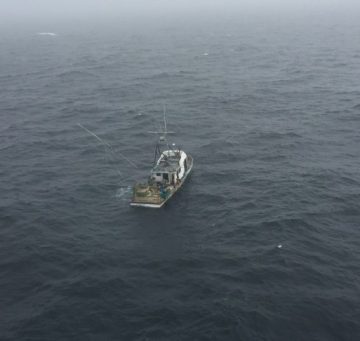 The Coast Guard on Sunday plucked three fisherman from the waters along the southern Oregon Coast — about eight miles west of Cape Blanco — less than 90 minutes after the fisherman made a “mayday” call. The three fishermen, reportedly uninjured, are aboard a Coast Guard 47-foot Motor Lifeboat en route to Station Coos Bay, located in Charleston, after abandoning their fishing vessel when it started taking on water. Coast Guard watchstanders at Coast Guard Sector North Bend received a mayday call from the fishing vessel McCalis, homeported in Charleston, over VHF-FM radio channel 16 at 11:54 a.m. The fishing crew reported their fishing vessel was taking on water through the fish hold and the dewatering pumps were not keeping up. The crew also announced their intention to abandon ship. Sector North Bend directed the launch of 47-foot MLBs from search and rescue detachments Coquille River operated by Station Coos Bay personnel and Rogue River operated by personnel from Station Chetco River in Brookings. An aircrew aboard an MH-65 Dolphin helicopter from Sector North Bend also launched to assist the fishermen. Both the aircrew and MLB crew from Coquille River arrived on scene at about the same time but with only about 300 feet of visibility due to fog, the boatcrew picked up the fishermen. Link 07:35
The Coast Guard on Sunday plucked three fisherman from the waters along the southern Oregon Coast — about eight miles west of Cape Blanco — less than 90 minutes after the fisherman made a “mayday” call. The three fishermen, reportedly uninjured, are aboard a Coast Guard 47-foot Motor Lifeboat en route to Station Coos Bay, located in Charleston, after abandoning their fishing vessel when it started taking on water. Coast Guard watchstanders at Coast Guard Sector North Bend received a mayday call from the fishing vessel McCalis, homeported in Charleston, over VHF-FM radio channel 16 at 11:54 a.m. The fishing crew reported their fishing vessel was taking on water through the fish hold and the dewatering pumps were not keeping up. The crew also announced their intention to abandon ship. Sector North Bend directed the launch of 47-foot MLBs from search and rescue detachments Coquille River operated by Station Coos Bay personnel and Rogue River operated by personnel from Station Chetco River in Brookings. An aircrew aboard an MH-65 Dolphin helicopter from Sector North Bend also launched to assist the fishermen. Both the aircrew and MLB crew from Coquille River arrived on scene at about the same time but with only about 300 feet of visibility due to fog, the boatcrew picked up the fishermen. Link 07:35
Gulf of Mexico Fishery Management Council meeting August 15 – 18, 2016, New Orleans, LA
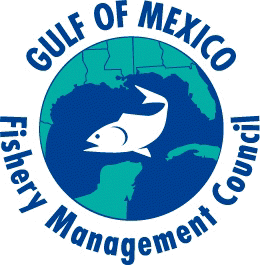 The Gulf of Mexico Fishery Management Council will meet August 15 – 18, 2016, at the Astor Crowne Plaza hotel in New Orleans, LA. Committee meetings will convene Monday at 8:30 am and conclude at 11:00 am Wednesday. The full Council will convene Wednesday morning beginning at 11:15 am. The Council is expected to adjourn by 4:15 pm Thursday. Committees & Council Agenda Click here . Public comment is scheduled Wednesday from 2:00 pm to 5:00 pm. Testimony will be taken on the following: • Flower Garden Banks National Marine Sanctuary Draft Environmental Impact Statement • Open testimony on any other fishery issues or concerns Council meetings are open to the public and are broadcast live over the internet. Register for the webinar Click here 20:48
The Gulf of Mexico Fishery Management Council will meet August 15 – 18, 2016, at the Astor Crowne Plaza hotel in New Orleans, LA. Committee meetings will convene Monday at 8:30 am and conclude at 11:00 am Wednesday. The full Council will convene Wednesday morning beginning at 11:15 am. The Council is expected to adjourn by 4:15 pm Thursday. Committees & Council Agenda Click here . Public comment is scheduled Wednesday from 2:00 pm to 5:00 pm. Testimony will be taken on the following: • Flower Garden Banks National Marine Sanctuary Draft Environmental Impact Statement • Open testimony on any other fishery issues or concerns Council meetings are open to the public and are broadcast live over the internet. Register for the webinar Click here 20:48
PAT NEAL: Whales’ boundless salmon appetite
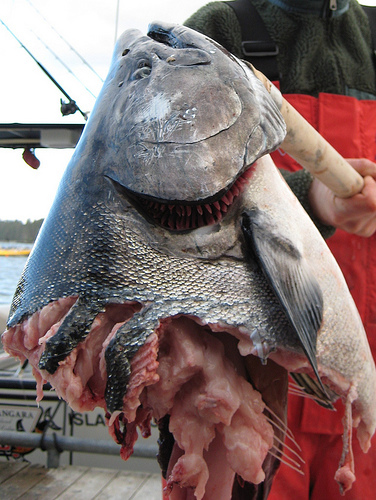 Then there are the many other toxic concerns to keep you awake at night, such as: Are your whales getting enough salmon? A recent article in the Peninsula Daily News (“Diet Decline: Smaller Chinook Mean Lighter Meals For Resident Orcas,” PDN, July 28) detailed the exhaustive research by legions of dedicated researchers who have detailed the declining diet of the orca, or killer whale. Scientists studying the orca fecal matter (yes this is a real job) have revealed that Southern Resident killer whales have evolved to consume a diet of king salmon or chinook in preference to all the other species. The current salmon famine is threatening the most important component of the whale-watching industry: whales. The scientists are quick to parade a list of the usual suspects — overfishing, habitat loss and climate change — while ignoring another common conundrum of concern: the destruction of one endangered species by another. Read the story here 12:37
Then there are the many other toxic concerns to keep you awake at night, such as: Are your whales getting enough salmon? A recent article in the Peninsula Daily News (“Diet Decline: Smaller Chinook Mean Lighter Meals For Resident Orcas,” PDN, July 28) detailed the exhaustive research by legions of dedicated researchers who have detailed the declining diet of the orca, or killer whale. Scientists studying the orca fecal matter (yes this is a real job) have revealed that Southern Resident killer whales have evolved to consume a diet of king salmon or chinook in preference to all the other species. The current salmon famine is threatening the most important component of the whale-watching industry: whales. The scientists are quick to parade a list of the usual suspects — overfishing, habitat loss and climate change — while ignoring another common conundrum of concern: the destruction of one endangered species by another. Read the story here 12:37
Lobstermen battle for bragging rights in 52nd annual Winter Harbor boat race
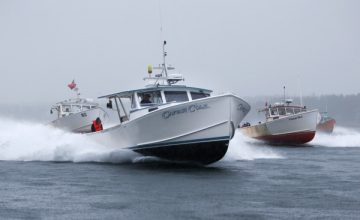 Boats lined up along both sides of the course to watch each wave of racers barrel down the stretch between Grindstone and Schoodic. The few landlocked spectators that braved the rain gathered around the closest vantage point at Frazer Point, donning ponchos, umbrellas and sets of binoculars. The 52nd annual Winter Harbor Lobster Boat Races was about to start, with more than 70 boats and their fishermen racing around Henry Cove Saturday from early morning to afternoon. Read the rest, and see 18 images of the event here 10:49
Boats lined up along both sides of the course to watch each wave of racers barrel down the stretch between Grindstone and Schoodic. The few landlocked spectators that braved the rain gathered around the closest vantage point at Frazer Point, donning ponchos, umbrellas and sets of binoculars. The 52nd annual Winter Harbor Lobster Boat Races was about to start, with more than 70 boats and their fishermen racing around Henry Cove Saturday from early morning to afternoon. Read the rest, and see 18 images of the event here 10:49
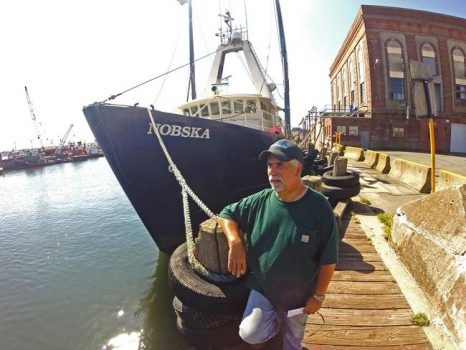
Life aboard the New Bedford trawler Nobska
The workload is daunting for Geoff Hatfield and his crew on the New Bedford-based fishing boat, but they wouldn’t have it any other way. The captain, Geoff Hatfield, was busy on deck but said he had a few minutes. I (Mark Patinkin) climbed aboard and followed him up to the wheelhouse. His trawler is named the Nobska, and it’s a big one, at 90 feet. It’s been fishing for haddock, which is plentiful these days — on their last trip they came home with 72,000 pounds. Because of that, Hatfield brought an extra man for this trip to make a crew of six. They were below helping guide 30 tons of ice into the hold. As soon as that was done, the Nobska would be off on a 12-hour steam to Nantucket Shoals. That would put them there near midnight, bedtime in most worlds but not in fishing. Right away, they’d set the net for a two-hour tow, haul it back, empty it and set it out again — and on like that for five days. That’s how long they’d be gone. Hatfield is 57 and has been a captain more than 30 years, the last eight on the Nobska. He takes 48 hours between trips but no more than that. “This boat,” Hatfield said, “doesn’t stop fishing.” Read the story here 10:00
Cod Is Dead—Is Dogfish the Answer?
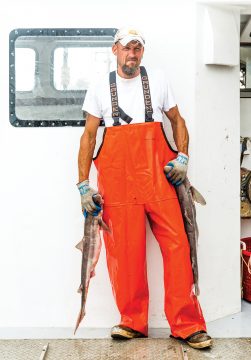 On a wind-tossed autumn morning off the Cape Cod coast, the aft deck of Doug Feeney’s 36-foot fishing boat, the Noah, is buried beneath a squirming, slimy, shin-deep layer of sharks. The Noah’s hauler growls under the weight of the 300-hook long line emerging from the froth-tipped Atlantic. The reek of gasoline mingles with salt. A procession of small gray sharks, each pierced neatly through the jaw by a steel hook, materializes from the depths. Feeney, a lean fisherman whose goatee and hoop earrings lend him a vaguely piratical mien, yanks the sharks from the line with the steady rhythm of an assembly-line worker. A drained cup of coffee perches on the dashboard; James Taylor warbles on the radio. “Twenty-five years ago we’d catch 10,000 pounds of these things every day,” Feeney shouts over the roar of the engines and “Fire and Rain.” “We’d just throw ’em back over the side.” Like many Chatham fishermen, Feeney is a jack-of-all-trades. He gillnets monkfish in early spring, he trolls for bluefin tuna in late fall. But no species occupies more of his energy than the spiny dogfish, the dachshund-size shark now piling up on the Noah’s deck. Read the story here 09:27
On a wind-tossed autumn morning off the Cape Cod coast, the aft deck of Doug Feeney’s 36-foot fishing boat, the Noah, is buried beneath a squirming, slimy, shin-deep layer of sharks. The Noah’s hauler growls under the weight of the 300-hook long line emerging from the froth-tipped Atlantic. The reek of gasoline mingles with salt. A procession of small gray sharks, each pierced neatly through the jaw by a steel hook, materializes from the depths. Feeney, a lean fisherman whose goatee and hoop earrings lend him a vaguely piratical mien, yanks the sharks from the line with the steady rhythm of an assembly-line worker. A drained cup of coffee perches on the dashboard; James Taylor warbles on the radio. “Twenty-five years ago we’d catch 10,000 pounds of these things every day,” Feeney shouts over the roar of the engines and “Fire and Rain.” “We’d just throw ’em back over the side.” Like many Chatham fishermen, Feeney is a jack-of-all-trades. He gillnets monkfish in early spring, he trolls for bluefin tuna in late fall. But no species occupies more of his energy than the spiny dogfish, the dachshund-size shark now piling up on the Noah’s deck. Read the story here 09:27
N.J. fishermen reel in $767K pay day with 236- Bigeye pound tuna
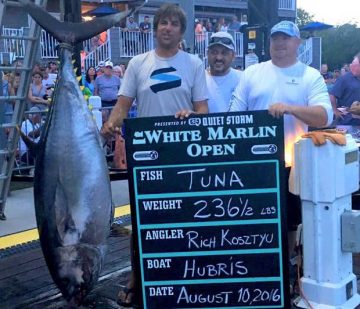 A Trenton firefighter and police sergeant fishing from an Ocean County boat caught a 236.5-pound bigeye tuna this week at a tournament in Maryland. Two days later, after all the fish had been weighed, it netted them a $767,091 check. Brian Suschke, the police sergeant, and Rich Kosztyu, the firefighter, fish in tournaments often with friend Damien Romeo, who owns the boat, “Hubris” out of Forked River. And they’ve fished the White Marlin Open in Ocean City , Md. for years, but have never caught a fish this big or hauled in this much prize money. The fish’s weight and payout were records this year in the tournament’s tuna category. Read the story here 08:54
A Trenton firefighter and police sergeant fishing from an Ocean County boat caught a 236.5-pound bigeye tuna this week at a tournament in Maryland. Two days later, after all the fish had been weighed, it netted them a $767,091 check. Brian Suschke, the police sergeant, and Rich Kosztyu, the firefighter, fish in tournaments often with friend Damien Romeo, who owns the boat, “Hubris” out of Forked River. And they’ve fished the White Marlin Open in Ocean City , Md. for years, but have never caught a fish this big or hauled in this much prize money. The fish’s weight and payout were records this year in the tournament’s tuna category. Read the story here 08:54
Fisherman in medical distress rescued from fishing boat off Ucluelet
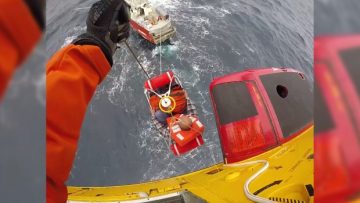 A crew member of a commercial fishing boat off the coast of Vancouver Island was hoisted to safety Thursday after experiencing a medical issue, rescuers say. A search and rescue crew from the 442 rescue squadron was called into action about 165 nautical miles southwest of Ucluelet. A Cormorant helicopter and Buffalo aircraft responded, and a rescue technician was lowed onto the deck of the boat to assist the crew member. He was then hoisted to the helicopter hovering above and flown to Victoria General Hospital for treatment of the unspecified medical issue, according to the Joint Rescue Coordination Centre. Video taken by rescue crews shows a birds-eye-view of the operation as the victim is hoisted up to the helicopter. Watch the video here 17:52
A crew member of a commercial fishing boat off the coast of Vancouver Island was hoisted to safety Thursday after experiencing a medical issue, rescuers say. A search and rescue crew from the 442 rescue squadron was called into action about 165 nautical miles southwest of Ucluelet. A Cormorant helicopter and Buffalo aircraft responded, and a rescue technician was lowed onto the deck of the boat to assist the crew member. He was then hoisted to the helicopter hovering above and flown to Victoria General Hospital for treatment of the unspecified medical issue, according to the Joint Rescue Coordination Centre. Video taken by rescue crews shows a birds-eye-view of the operation as the victim is hoisted up to the helicopter. Watch the video here 17:52
Deadliest Catch Comes to Oregon
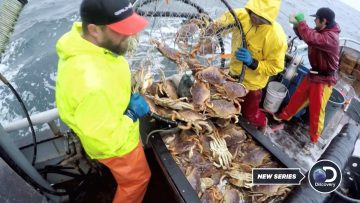 Deadliest Catch has been a mainstay of the Discovery Channel for over ten years. It shows the working conditions of crabbers in the North Pacific who fish for king crab and snow crab out of ports like Dutch Harbor and St. Paul. Now the show is coming to the Pacific Northwest. Discovery Channel is now launching a spinoff titled Deadliest Catch – Dungeon Cove. It’s based in Newport, Oregon and it will follow the commercial dungeness crab fishery (even though there is no Dungeon Cove). There has been discussion in the past few years or so about just how deadly is the “Deadliest Catch,” and perhaps this debate was the reasoning behind this spinoff. The Northwest dungeness commercial- crab fishery, however, is still seeing high rates of injury and death compared to other fisheries in the United States. The Northwest coast is particularly rough, and dungeness crab are commercially fished in the winter (similar to Alaska commercial crab seasons) when the weather is at its worst. Read the story here 13:03
Deadliest Catch has been a mainstay of the Discovery Channel for over ten years. It shows the working conditions of crabbers in the North Pacific who fish for king crab and snow crab out of ports like Dutch Harbor and St. Paul. Now the show is coming to the Pacific Northwest. Discovery Channel is now launching a spinoff titled Deadliest Catch – Dungeon Cove. It’s based in Newport, Oregon and it will follow the commercial dungeness crab fishery (even though there is no Dungeon Cove). There has been discussion in the past few years or so about just how deadly is the “Deadliest Catch,” and perhaps this debate was the reasoning behind this spinoff. The Northwest dungeness commercial- crab fishery, however, is still seeing high rates of injury and death compared to other fisheries in the United States. The Northwest coast is particularly rough, and dungeness crab are commercially fished in the winter (similar to Alaska commercial crab seasons) when the weather is at its worst. Read the story here 13:03
Sweden digs in on proposal to ban live American lobsters from Europe
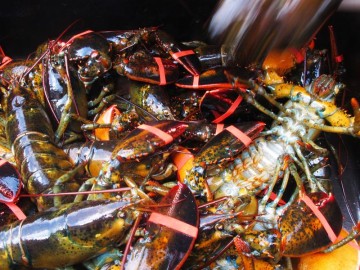 Sweden is digging in on a proposal to ban imports of live lobsters into the European Union after a rebuke from American scientists, and the issue could go all the way to the World Trade Organization. Sweden asked the European Union to bar imports of live American lobsters into the bloc earlier this year after 32 American lobsters were found in Swedish waters. The U.S. government then told the European Commission that the proposal isn’t supported by science, and American and Canadian scientists issued reports calling the Swedish claim into question. Lobstermen in America and Canada, which together export $200 million worth of lobster to European markets each year, are hopeful that Sweden’s call for a ban eventually amounts to nothing. “I haven’t taken my Swedish engine out of my boat yet,” said Gerry Cushman, a Port Clyde lobsterman. “I’d like to see lobsters stay open throughout the world everywhere.” 11:25
Sweden is digging in on a proposal to ban imports of live lobsters into the European Union after a rebuke from American scientists, and the issue could go all the way to the World Trade Organization. Sweden asked the European Union to bar imports of live American lobsters into the bloc earlier this year after 32 American lobsters were found in Swedish waters. The U.S. government then told the European Commission that the proposal isn’t supported by science, and American and Canadian scientists issued reports calling the Swedish claim into question. Lobstermen in America and Canada, which together export $200 million worth of lobster to European markets each year, are hopeful that Sweden’s call for a ban eventually amounts to nothing. “I haven’t taken my Swedish engine out of my boat yet,” said Gerry Cushman, a Port Clyde lobsterman. “I’d like to see lobsters stay open throughout the world everywhere.” 11:25
Will California Approve Massive Offshore Wind Farm Project?
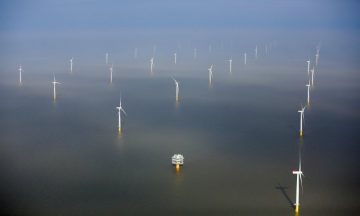 The deep waters off the coast of California could become home to the country’s largest offshore wind energy project and a test case for a technology that is still in its infancy. The 765-megawatt project, proposed by Seattle-based Trident Winds, would sit about 25 miles off California’s central coast, near the town of Cambria. If built, it will be larger than the 630-megawatt London Array off the coast of Kent, – the world’s largest working offshore wind farm that began operating in 2013. To win government approval, Trident will have to prepare a lengthy report to investigate the potential environmental impact of its project. California’s coast is a major migration route for several whale species, and the underwater structures of the floating wind turbines could pose an entanglement risk. The Trident project calls for mounting 100 turbines on floating foundations in water that’s roughly half a mile deep. Read the rest here 09:29
The deep waters off the coast of California could become home to the country’s largest offshore wind energy project and a test case for a technology that is still in its infancy. The 765-megawatt project, proposed by Seattle-based Trident Winds, would sit about 25 miles off California’s central coast, near the town of Cambria. If built, it will be larger than the 630-megawatt London Array off the coast of Kent, – the world’s largest working offshore wind farm that began operating in 2013. To win government approval, Trident will have to prepare a lengthy report to investigate the potential environmental impact of its project. California’s coast is a major migration route for several whale species, and the underwater structures of the floating wind turbines could pose an entanglement risk. The Trident project calls for mounting 100 turbines on floating foundations in water that’s roughly half a mile deep. Read the rest here 09:29
Born and bred lobstermen know how to hustle
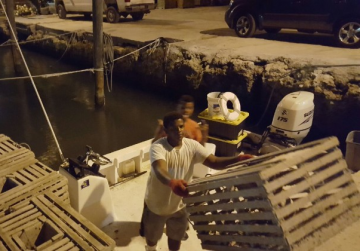 On summer break, the alarm goes off at 4:30 a.m., and two Key West High School soon-to-be sophomores open their eyes. Cousins Demi Stiglitz and Peder Bidonne, both 15, brush their teeth, put on a little deodorant and climb into dad Richie Stiglitz’s truck. From there, they sleep for the 30-minute ride to Marathon from their Sugarloaf house, hope dad stops for quick breakfast from The Stuffed Pig, and by 5:30 a.m. they are fishing. “We’ve been on-and-popping since we were 12 years old,” said Demi, while sitting at the dinner table covered in fresh fried grouper after a long day on the boat. “Straight saving money.” The two are saving their money from their 500 lobster traps and 800 crab traps to buy their own boat. Read the rest here 09:07
On summer break, the alarm goes off at 4:30 a.m., and two Key West High School soon-to-be sophomores open their eyes. Cousins Demi Stiglitz and Peder Bidonne, both 15, brush their teeth, put on a little deodorant and climb into dad Richie Stiglitz’s truck. From there, they sleep for the 30-minute ride to Marathon from their Sugarloaf house, hope dad stops for quick breakfast from The Stuffed Pig, and by 5:30 a.m. they are fishing. “We’ve been on-and-popping since we were 12 years old,” said Demi, while sitting at the dinner table covered in fresh fried grouper after a long day on the boat. “Straight saving money.” The two are saving their money from their 500 lobster traps and 800 crab traps to buy their own boat. Read the rest here 09:07
Coast Guard medevacs fisherman off commercial fishing vessel near Manzanita, Ore.
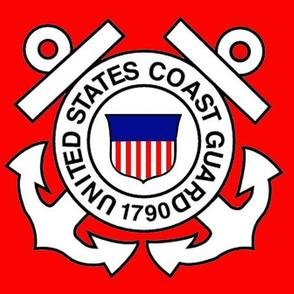 The Coast Guard conducted a medevac of a man experiencing chest pains 20 miles off the Manzanita coast on a commercial fishing vessel Friday morning. The 59-year old man was alert and responsive when he was transferred to Warrenton emergency medical services at Coast Guard Sector Columbia River in Warrenton by an MH-60 Jayhawk helicopter aircrew. Sector Columbia River Command Center received a VHF-FM radio call from the captain of the commercial fishing vessel Karen, homeported in Tillamook, requesting medical help for a crewmember. The aircrew launched at 10:44 a.m., and returned to base for the transfer at 12:16 p.m. The man was transported to Columbia Memorial Hospital by EMS. Link 08:55
The Coast Guard conducted a medevac of a man experiencing chest pains 20 miles off the Manzanita coast on a commercial fishing vessel Friday morning. The 59-year old man was alert and responsive when he was transferred to Warrenton emergency medical services at Coast Guard Sector Columbia River in Warrenton by an MH-60 Jayhawk helicopter aircrew. Sector Columbia River Command Center received a VHF-FM radio call from the captain of the commercial fishing vessel Karen, homeported in Tillamook, requesting medical help for a crewmember. The aircrew launched at 10:44 a.m., and returned to base for the transfer at 12:16 p.m. The man was transported to Columbia Memorial Hospital by EMS. Link 08:55
Illuminating Fishing Nets Prevent Bycatch
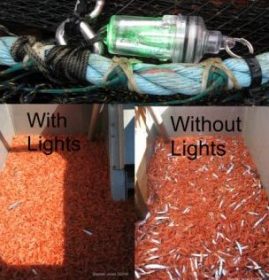 Bycatch is an economic and environmental problem for commercial fishing. Large trawlers often scoop up sea-life other than the species they’re targeting, and if there’s too much bycatch fishermen sometimes have to dump their catch. But Bob Hannah of the Oregon Department of Fish and Wildlife may have found a simple, affordable solution. He tells Living on Earth’s Emmett FitzGerald how local shrimp fishermen are eliminating bycatch of an important smelt species by lighting up their nets with LEDs. The waters off the coast of Oregon teem with delectable pink shrimp. But shrimpers often also scoop up fish they don’t want, what’s known as “by-catch”, in particular a smelt called the eulachon. And that is costly – for the eulachon, and the fishing boat operators. But Government scientists have discovered a nifty way to cut the eulachon by-catch using LED lights. Bob Hannah of the Oregon Department of Fish and Wildlife told Living on Earth’s Emmett FitzGerald all about it. Read the story here 19:59
Bycatch is an economic and environmental problem for commercial fishing. Large trawlers often scoop up sea-life other than the species they’re targeting, and if there’s too much bycatch fishermen sometimes have to dump their catch. But Bob Hannah of the Oregon Department of Fish and Wildlife may have found a simple, affordable solution. He tells Living on Earth’s Emmett FitzGerald how local shrimp fishermen are eliminating bycatch of an important smelt species by lighting up their nets with LEDs. The waters off the coast of Oregon teem with delectable pink shrimp. But shrimpers often also scoop up fish they don’t want, what’s known as “by-catch”, in particular a smelt called the eulachon. And that is costly – for the eulachon, and the fishing boat operators. But Government scientists have discovered a nifty way to cut the eulachon by-catch using LED lights. Bob Hannah of the Oregon Department of Fish and Wildlife told Living on Earth’s Emmett FitzGerald all about it. Read the story here 19:59
Clam chowder calamity as fishing crew pulls up unexploded ordnance
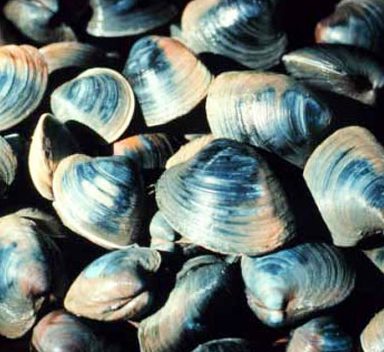 A fishing crew apparently pulled up unexploded ordnance while clamming, leading to a fisherman being hospitalized with second-degree burns and the destruction of more than 700 cases of chowder, officials said. It’s unclear what the ordnance was, but fishing vessels along the Atlantic Coast routinely dredge up munitions, including mustard agent, that was dumped at sea decades ago when environmental laws were far more lax. The injured fisherman was treated at a hospital in Philadelphia for burns and blisters, said U.S. Coast Guard Petty Officer Seth Johnson. Such injuries are consistent with mustard agent exposure. The crew of the fishing vessel the William Lee found what they believed was an old or discarded ordnance canister on Aug. 2 and threw it back into the ocean 30 miles east of Barnegat Inlet, Johnson said. Larry Hajna, a spokesman for the state Department of Environmental Protection, said the agency wasn’t told about it until Tuesday — a week later. The agency immediately reported it to the Coast Guard, he said. The boat was impounded in Atlantic City and inspected Wednesday, but no hazardous materials were found, Johnson said. In the meantime, clams from the vessel had already been delivered to Sea Watch International, a seafood processor in Milford, Delaware. More than 500 cases of clam chowder were impounded,, Read the rest here 15:38
A fishing crew apparently pulled up unexploded ordnance while clamming, leading to a fisherman being hospitalized with second-degree burns and the destruction of more than 700 cases of chowder, officials said. It’s unclear what the ordnance was, but fishing vessels along the Atlantic Coast routinely dredge up munitions, including mustard agent, that was dumped at sea decades ago when environmental laws were far more lax. The injured fisherman was treated at a hospital in Philadelphia for burns and blisters, said U.S. Coast Guard Petty Officer Seth Johnson. Such injuries are consistent with mustard agent exposure. The crew of the fishing vessel the William Lee found what they believed was an old or discarded ordnance canister on Aug. 2 and threw it back into the ocean 30 miles east of Barnegat Inlet, Johnson said. Larry Hajna, a spokesman for the state Department of Environmental Protection, said the agency wasn’t told about it until Tuesday — a week later. The agency immediately reported it to the Coast Guard, he said. The boat was impounded in Atlantic City and inspected Wednesday, but no hazardous materials were found, Johnson said. In the meantime, clams from the vessel had already been delivered to Sea Watch International, a seafood processor in Milford, Delaware. More than 500 cases of clam chowder were impounded,, Read the rest here 15:38
Pacific Seafoods faces new lawsuit alleging anti-competitive behavior
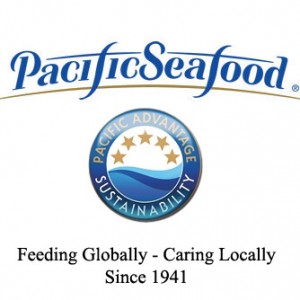 Oregon-based Seawater Seafoods has sued its larger rival Pacific Seafoods in federal court bringing allegations of anticompetitive behavior and claims that Pacific is blocking Seawater’s waterfront access. Seawater is a Dungeness crab processor that recently expanded into squid and albacore and intends to add coldwater shrimp and trawl-caught groundfish to its business. The Newport, Oregon-based firm is bordered on both sides by Pacific and accuses the company of several behaviors it describes as anti-competitive. “Throughout the 2014-15 crab season defendants relentlessly harassed plaintiffs, intimidated Seawater’s suppliers, obstructed its access to public waterways, allowed its property to be damaged by wild animals and noxious chemicals, and generally acted in a manner calculated to snuff out plaintiffs’ competing business,” the complaint states. Read the rest here 14:36
Oregon-based Seawater Seafoods has sued its larger rival Pacific Seafoods in federal court bringing allegations of anticompetitive behavior and claims that Pacific is blocking Seawater’s waterfront access. Seawater is a Dungeness crab processor that recently expanded into squid and albacore and intends to add coldwater shrimp and trawl-caught groundfish to its business. The Newport, Oregon-based firm is bordered on both sides by Pacific and accuses the company of several behaviors it describes as anti-competitive. “Throughout the 2014-15 crab season defendants relentlessly harassed plaintiffs, intimidated Seawater’s suppliers, obstructed its access to public waterways, allowed its property to be damaged by wild animals and noxious chemicals, and generally acted in a manner calculated to snuff out plaintiffs’ competing business,” the complaint states. Read the rest here 14:36
A total shutdown of all salmon fisheries on the Fraser River to conserve sockeye
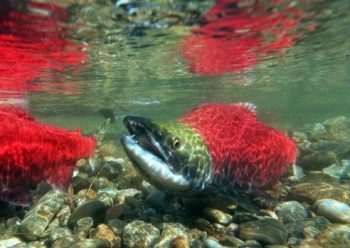 The Fraser River was shut down Thursday at sundown to all salmon fishing due to conservation concerns about sockeye. The notice of “immediate closure” of all salmon fisheries went out from DFO for the tidal and non-tidal sections of the Fraser. “Current run size estimates of Fraser River Summer Run sockeye salmon have resulted in no allowable harvest and a conservation concern,” according to the abrupt notice from Fisheries and Oceans Canada. The Summer run of Fraser sockeye is usually the strongest. Not this year. “The Department’s first priority is to ensure that there is sufficient sockeye returning to the spawning grounds. The Department will manage all fisheries to minimize sockeye impacts and provide priority access to First Nations’ fishing for food, social and ceremonial purposes.” Recreational anglers had been targeting chinook selectively but the risk was considered is too great for accidentally intercepting sockeye. DFO even mentioned it in their notice. Read the rest here 14:23
The Fraser River was shut down Thursday at sundown to all salmon fishing due to conservation concerns about sockeye. The notice of “immediate closure” of all salmon fisheries went out from DFO for the tidal and non-tidal sections of the Fraser. “Current run size estimates of Fraser River Summer Run sockeye salmon have resulted in no allowable harvest and a conservation concern,” according to the abrupt notice from Fisheries and Oceans Canada. The Summer run of Fraser sockeye is usually the strongest. Not this year. “The Department’s first priority is to ensure that there is sufficient sockeye returning to the spawning grounds. The Department will manage all fisheries to minimize sockeye impacts and provide priority access to First Nations’ fishing for food, social and ceremonial purposes.” Recreational anglers had been targeting chinook selectively but the risk was considered is too great for accidentally intercepting sockeye. DFO even mentioned it in their notice. Read the rest here 14:23
Greenland shark named longest-living vertebrate living up to 400 yrs
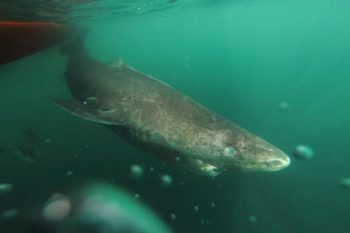 A student job with the Greenland Institute of Natural Resources inspired Julius Nielsen, lead author of the new study, to research the Greenland shark, which roams the chill waters of the North Atlantic. “I encountered the sharks here for the first time, and I was fascinated that so little were known about such large sharks,” Nielsen said. They are the largest fish native to Arctic seas, with adults typically measuring between 13 and 16 feet and females consistently outgrowing the males. Still, their biology was mostly a mystery, explained Nielsen. “For example, their age was unknown but expected to be great,” he said, based on studies from more than 50 years ago. The extremely slow growth rates of these sharks — less than a centimeter per year — suggested they must live for many years.” So how do you discover the age of a mute primordial shark? Nielsen and his colleagues turned to radiocarbon dating. Read the rest here 13:53
A student job with the Greenland Institute of Natural Resources inspired Julius Nielsen, lead author of the new study, to research the Greenland shark, which roams the chill waters of the North Atlantic. “I encountered the sharks here for the first time, and I was fascinated that so little were known about such large sharks,” Nielsen said. They are the largest fish native to Arctic seas, with adults typically measuring between 13 and 16 feet and females consistently outgrowing the males. Still, their biology was mostly a mystery, explained Nielsen. “For example, their age was unknown but expected to be great,” he said, based on studies from more than 50 years ago. The extremely slow growth rates of these sharks — less than a centimeter per year — suggested they must live for many years.” So how do you discover the age of a mute primordial shark? Nielsen and his colleagues turned to radiocarbon dating. Read the rest here 13:53
Over 250 Fishermen Rescued From Bay Of Bengal
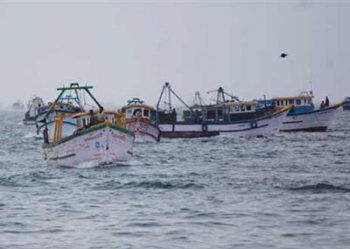 Kolkata: In one of the biggest search and rescue operations in the Bay of Bengal, over 250 fishermen in 18 fishing trawlers which had gone missing in the sea during rough weather have been rescued by the Coast Guard, officials said today. The Coast Guard has been doing a search and rescue operation to locate the missing fishing boats in the Bay of Bengal for the last 48 hours. “We have ensured safe return of 18 boats with about 254 fishermen to harbour,” officials said. Apart from diverting its ships patrolling at sea, additional surface and air assets have been pressed into service to augment the search. The operation is on for the last 48 hours and will continue till reports are received that all fishermen are safe, the officials said. Read the rest here 11:25
Kolkata: In one of the biggest search and rescue operations in the Bay of Bengal, over 250 fishermen in 18 fishing trawlers which had gone missing in the sea during rough weather have been rescued by the Coast Guard, officials said today. The Coast Guard has been doing a search and rescue operation to locate the missing fishing boats in the Bay of Bengal for the last 48 hours. “We have ensured safe return of 18 boats with about 254 fishermen to harbour,” officials said. Apart from diverting its ships patrolling at sea, additional surface and air assets have been pressed into service to augment the search. The operation is on for the last 48 hours and will continue till reports are received that all fishermen are safe, the officials said. Read the rest here 11:25
New Rules Ban Seafood Imports That Don’t Meet Strict U.S. Standards for Marine Mammal Protection
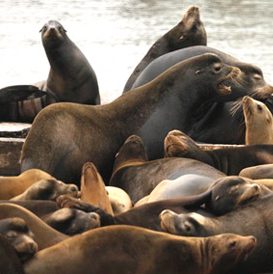 The National Marine Fisheries Service issued regulations Thursday prohibiting seafood imports from nations whose fisheries kill more whales and dolphins than U.S. standards allow. Each year around 650,000 whales, dolphins and other marine mammals are unintentionally caught and killed in fishing gear worldwide. Under the new rule, foreign fishermen must meet the same marine mammal protection standards applied to U.S. fishermen or their fish will be banned from the lucrative American seafood market. The rule is the result of a settlement in a lawsuit brought by conservation groups two years ago. The new rules will be put in place gradually with full implementation by 2022. Exporting nations will now need to track and monitor fisheries and whale, dolphin and other marine mammal populations, modify fishing gear, and may even have to close fishing in some areas to limit entanglement risk. Read the rest here 10:51 Today, NMFS published a final rule implementing import provisions of the.
The National Marine Fisheries Service issued regulations Thursday prohibiting seafood imports from nations whose fisheries kill more whales and dolphins than U.S. standards allow. Each year around 650,000 whales, dolphins and other marine mammals are unintentionally caught and killed in fishing gear worldwide. Under the new rule, foreign fishermen must meet the same marine mammal protection standards applied to U.S. fishermen or their fish will be banned from the lucrative American seafood market. The rule is the result of a settlement in a lawsuit brought by conservation groups two years ago. The new rules will be put in place gradually with full implementation by 2022. Exporting nations will now need to track and monitor fisheries and whale, dolphin and other marine mammal populations, modify fishing gear, and may even have to close fishing in some areas to limit entanglement risk. Read the rest here 10:51 Today, NMFS published a final rule implementing import provisions of the.
Environmental group distraught as tuna conservation body succumbs to politics
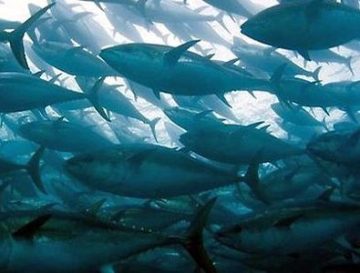 The international scientific research and public policy advocacy group, Pew Charitable Trusts, is again calling for a two-year moratorium on the commercial fishing of Pacific bluefin tuna. It comes after the group in charge of looking after tuna conservation failed to recommend action, despite stocks dropping to crisis levels. Angry environment groups say some of the 40 nations that make up the Western and Central Pacific Fisheries Commission are putting politics above scientific advice. And after 10 days of talks in Bali, Pew’s Director for Global Tuna Conservation Amanda Nickson says the commission’s scientific committee has done nothing. Listen to the audio here 10:22
The international scientific research and public policy advocacy group, Pew Charitable Trusts, is again calling for a two-year moratorium on the commercial fishing of Pacific bluefin tuna. It comes after the group in charge of looking after tuna conservation failed to recommend action, despite stocks dropping to crisis levels. Angry environment groups say some of the 40 nations that make up the Western and Central Pacific Fisheries Commission are putting politics above scientific advice. And after 10 days of talks in Bali, Pew’s Director for Global Tuna Conservation Amanda Nickson says the commission’s scientific committee has done nothing. Listen to the audio here 10:22
PETA is Hooked on Killing the Fishing Industry
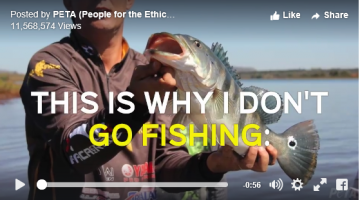 The organization People for the Ethical Treatment of Animals (PETA) recently posted a laughable video calling for an end to fishing. In the video entitled “Fish Feel Pain,” PETA suggests fishing is bad for the environment, encourages kids to terrorize animals, and harms health. Good lord! Much to the chagrin of PETA, the fishing industry–whether commercial or recreational–promotes a culture of true sustainability, family fun, and economic productivity. Fishing promotes conservation Contrary to PETA’s claims, fishing actually does promote conservation. The methods employed by anglers are deeply rooted in conservation because we want to enjoy fish for years to come. If we resort to overfishing, then the industry would tank and the environment would suffer as a result. Anglers like and encourage clean waterways, ethical methods, and safety at all times–with minimal government interference, of course. It’s our job to be good stewards of the environment–unlike those annoying radical environmentalists who lead hypocritical lives. Watch the video, and read the rest here 09:50
The organization People for the Ethical Treatment of Animals (PETA) recently posted a laughable video calling for an end to fishing. In the video entitled “Fish Feel Pain,” PETA suggests fishing is bad for the environment, encourages kids to terrorize animals, and harms health. Good lord! Much to the chagrin of PETA, the fishing industry–whether commercial or recreational–promotes a culture of true sustainability, family fun, and economic productivity. Fishing promotes conservation Contrary to PETA’s claims, fishing actually does promote conservation. The methods employed by anglers are deeply rooted in conservation because we want to enjoy fish for years to come. If we resort to overfishing, then the industry would tank and the environment would suffer as a result. Anglers like and encourage clean waterways, ethical methods, and safety at all times–with minimal government interference, of course. It’s our job to be good stewards of the environment–unlike those annoying radical environmentalists who lead hypocritical lives. Watch the video, and read the rest here 09:50
As US’ first offshore wind farm takes root, study indicates wind may be more powerful, turbulent than expected
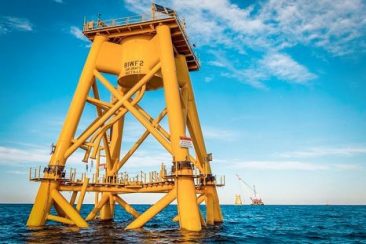 University of Delaware researchers report in a new study that offshore wind may be more powerful, yet more turbulent than expected in the North Eastern United States. The findings, published in a paper in theJournal of Geophysical Research: Atmospheres, could have important implications for the future development of offshore wind farms in the U.S., including the assessment of how much wind power can be produced, what type of turbines should be used, how many turbines should be installed and the spacing between each. The paper’s main finding is that atmospheric conditions around Cape Wind are predominantly turbulent, or unstable, which is in stark contrast to prevailing data from European offshore wind farms in the Baltic Sea and the North Sea. “By contrast, our study found that wind conditions at Cape Wind are unstable between 40 and 80 percent of the time, depending on season and time of day,” Read the story here 20:55
University of Delaware researchers report in a new study that offshore wind may be more powerful, yet more turbulent than expected in the North Eastern United States. The findings, published in a paper in theJournal of Geophysical Research: Atmospheres, could have important implications for the future development of offshore wind farms in the U.S., including the assessment of how much wind power can be produced, what type of turbines should be used, how many turbines should be installed and the spacing between each. The paper’s main finding is that atmospheric conditions around Cape Wind are predominantly turbulent, or unstable, which is in stark contrast to prevailing data from European offshore wind farms in the Baltic Sea and the North Sea. “By contrast, our study found that wind conditions at Cape Wind are unstable between 40 and 80 percent of the time, depending on season and time of day,” Read the story here 20:55

































